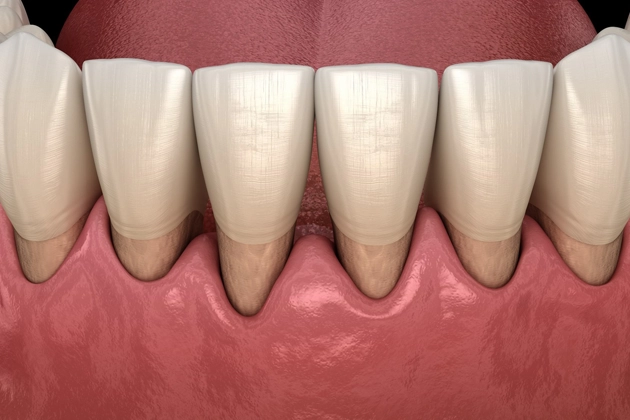
I Think My Gums Are Receding
For many patients, solutions for gum recession can enhance both their appearance and overall dental health. Gum recession can happen even to people with good oral hygiene. There are many options available to treat receding gums.
Solutions for gum recession are available at Coronado Dentistry & Pediatrics in Coronado and the surrounding area. Call us today at (619) 435 6231 to schedule an appointment and learn more.
Signs of Gum Recession
For some patients, gum recession may set in subtly and go unnoticed for some time. The aesthetic changes following gum recession are the most apparent. These include visibly shrinking gums and exposed tooth roots. However, other common symptoms include:
- Bad breath
- Bleeding after brushing or flossing
- Loose teeth
- Pain at the gum line
- Red, swollen gums
Patients may experience concerns about their appearance during this time, as well as a fear of losing teeth. Additionally, teeth may be particularly sensitive to cold and heat (due to the exposed tooth roots).
Causes of Gum Recession
Several factors can cause a person's gums to recede, regardless of the state of their oral hygiene. These include aggressive toothbrushing, body piercing, clenching or grinding teeth, crooked teeth or a misaligned bite, hormonal changes, insufficient dental care, periodontal disease, and tobacco products. Genetics may also be a factor. For example, parents may pass down weak, thin gums to their children.
Some patients may also find that their gums are receding only on one side. Usually, this is due to plaque concentrating in one area of the mouth. This may be due to neglecting oral hygiene on one side of the mouth, as excess plaque and bacteria at the gum line may release toxic substances that destroy gum tissue. Alternatively, a misaligned bite may cause more wear and tear to one side of the mouth than the other. Gum recession may happen on only one tooth for similar reasons or some physical trauma.
Treating Gum Recession
Some cases of gum recession are mild enough that they do not need treatment. Still, several treatment options are available for those who need it. These include composite restoration; desensitizing agents, varnishes, and dentin bonding agents; orthodontics; pink porcelain or composite; removable gum veneers; and surgery. Composite restorations are natural-looking, tooth-colored composite resins that cover the surface of the tooth root. They may be used to close any black gaps between the teeth.
Desensitizing agents, varnishes, and dentin bonding agents may help reduce the exposed tooth root's sensitivity. By lessening the nerve symptoms, desensitizing agents may ease the brushing of sensitive teeth and promote oral hygiene. Orthodontics (or braces) are more of a long-term treatment that moves a tooth slowly over time. This repositioning can help correct the margin of the gum.
Pink porcelain or composite that matches the color of the gums can be applied to the "gaps" to reduce the appearance of receded gums. Similarly, removable gum veneers, which usually consist of acrylic or silicone, can be applied in the "gaps." Finally, more severe cases of gum recession may necessitate surgery, usually a gum graft.
Preventing Gum Recession
Proper dental care is the number one way to prevent gum recession. This involves maintaining a routine where patients brush their teeth with a soft-bristled toothbrush at least twice daily and floss at least once daily. Patients should also see a dentist at least twice a year. At-risk patients may require more frequent visits, and a dentist that notices signs of gum recession may want to keep a vigilant watch that it does not worsen.
Patients may want to consider asking their dentist how to properly brush their teeth to ensure that they are not brushing too aggressively. Additionally, healthy lifestyle choices like eating a well-balanced diet and not smoking can lessen one's chances of gum recession dramatically.
It can be dangerous to leave gum recession untreated. Exposed tooth roots may decay very quickly, necessitating various expensive, painful procedures. Teeth may get more sensitive, and the appearance of the smile may become imbalanced. It is also possible that what patients are experiencing is not gum recession but undetected, worsening gum disease.
Risk Factors for Gum Recession
Certain populations may be more at risk for gum recession than others. For instance, age is a leading risk factor for receding gums, with almost 90% of people older than 65 reporting a receding gum in at least one tooth. Those who smoke or use other tobacco products also face an increased risk of receding gums, as they are more likely to develop sticky plaque.
Some genetic conditions, like thin or weak gums, may also increase one's chances of gum recession. Patients with diabetes may also be more likely to have their gums recede, as the disease might reduce the blood supply to the gums.